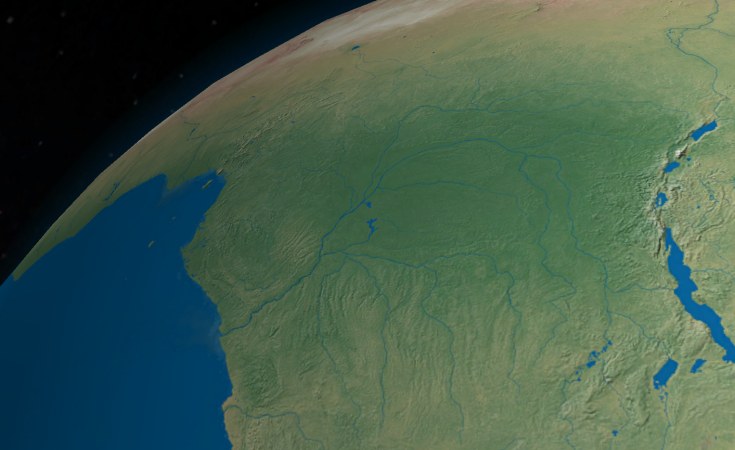Away from the headlines, announcements on deforestation and protecting the DRC's rainforests laid important groundwork for future action.
Although it didn't dominate the headlines around COP28, one of the most significant moments of the climate talks for the Democratic Republic of Congo (DRC) was its announcement of a new partnership to protect its invaluable rainforests.
The initiative - backed by the US, France, Germany, UK, Norway, and various foundations - aims to expand private investment in sectors such as agriculture, forestry, and eco-tourism. It includes $62 million of initial funding commitments, with further collaborations anticipated at COP29. Titled "People, Forests and Nature: Partnership for the New Climate Economy of the Democratic Republic of Congo", it hopes to help conserve and manage the DRC's forests, peatlands, and key biodiversity areas.
Alongside this announcement, COP28 also saw the launch of the Science Panel for the Congo Basin. This research coalition is led by over 300 scientists and supported by the UN Sustainable Development Solutions Network. It will study the Congo's role in regional climate regulation, human impacts on the forest ecosystem, and how scientific data can inform government policy.
These efforts are partly modelled on the efforts taken by Brazil and President Luiz Inácio Lula da Silva. The first-of-its-kind Science Panel for the Amazon was launched in 2020. Meanwhile, Brazil at COP28 announced the creation of a Tropical Forest Fund with a capital target of $250 billion.
Since retaking office, President Lula has been steadfast in his efforts to combat deforestation. In the first six months of his term, rates of deforestation have dropped 34%. The government has implemented robust policies aimed at reducing illegal logging and land clearances, while also emphasising sustainable development initiatives. Lula's administration has supported indigenous land rights, implemented stricter environmental regulations, and promoted conservation efforts through international cooperation.
This has provided welcome action in the face of global trends that estimate we lose around 5 million hectares of forest each year, with 95% of this disaster-inducing deforestation occurring in the tropics.
Indeed, in 2022 alone, deforestation in the Congo Basin, the "Lungs of Africa", accounted for 13% of global deforestation. My vast nation, home to the second-largest rainforest globally, faces this challenge due to various factors. Agricultural expansion, particularly for subsistence farming and commercial activities like palm oil and rubber production is a primary driver. Small-scale logging and illegal timber trade, fuelled by inadequate law enforcement and governance, also contribute significantly. Additionally, mining activities, infrastructure development, and population growth exacerbate the problem.
Rampant deforestation not only threatens the rich biodiversity of the Congo Basin but also endangers indigenous communities reliant on the forest for sustenance and cultural practices. Moreover, it contributes to global climate change by reducing the forest's capacity to sequester carbon dioxide.
Combating this challenge requires a holistic approach that integrates sustainable land use policies with community involvement, better enforcement of regulations, and international cooperation. With a strictly regulatory approach, like those taken by developed countries, we can wave the stick and penalise people for bad practices. But in countries like the DRC, people need incentives that open paths to more sustainable practices.
Such an approach is also more equitable. Big agricultural firms can absorb penalties or avoid them through legal loopholes. Local farmers cannot, and face hunger and impoverishment if they cannot maintain their livelihoods, potentially leading to displacement or conflict. It's important to consolidate efforts around incentives that change behaviour in a positive way, rather than penalties without alternatives. It is not one size fits all.
There is a glimmer of light with these new global agreements. More often than not, global climate targets make no mention of deforestation, which unfortunately enables states to get creative about reducing emissions but maintaining deforestation rates to prop up local industries. In this respect, COP28 made some progress overseen by its much criticised president Sultan Al-Jaber. Without global initiatives such as the ones proposed by the DRC and Brazil, and others that may be inspired by it beyond COP28, Brazil's progress, for example, can be easily reversed overnight with a change of government. Progress towards curbing deforestation and building sustainable energy in developing countries like the DRC may prove to elusive without such structures and alliances. The announcement of talks between Brazil, Indonesia and the DRC last year to create an "Opec for rainforests" is another example of necessary coordinated action to safeguard invaluable ecosystems.
Boosting these funds and partnerships broadens the focus beyond individual countries' efforts and correctly positions deforestation as an ongoing global challenge, recognising the interconnectedness of forests and their impact on climate. If states falter in their new commitments or fail to bring others to the table, we risk losing even this modest progress.
The consequences of inaction are too great, but we now have not just one starting point but several. We have the impetus to begin transforming the debate around deforestation into one where nations can work together in tangible ways to end it as part of a larger climate equation, rather than just point the finger and the wave the stick.
Malo Mobutu Ndimba is the Governor of Nord-Ubangi, a province in the Democratic Republic of Congo. Prior to entering elected office in August 2022, he was Chief Adviser in charge of Investment and Resource Mobilisation in DRC's Ministry of Urban Planning.


